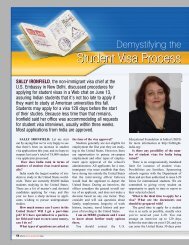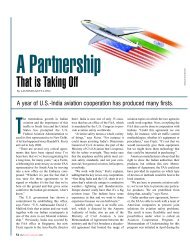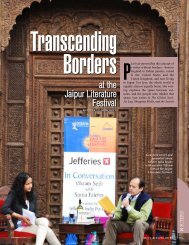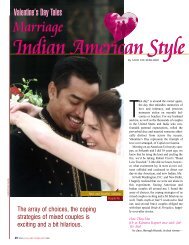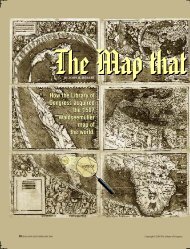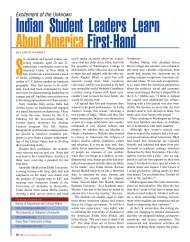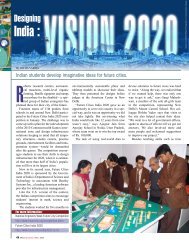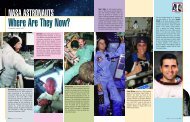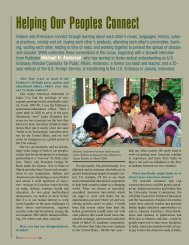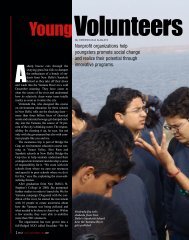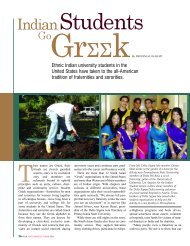A Half Century of Service, SPAN September ... - SPAN Magazine
A Half Century of Service, SPAN September ... - SPAN Magazine
A Half Century of Service, SPAN September ... - SPAN Magazine
Create successful ePaper yourself
Turn your PDF publications into a flip-book with our unique Google optimized e-Paper software.
MARRY ALLTAFFERR © AP-WWP<br />
A <strong>Half</strong> <strong>Century</strong><br />
<strong>of</strong> <strong>Service</strong><br />
By DOMENICK DIPASQUALE<br />
John McCain’s nomination as<br />
the 2008 Republican candidate for<br />
U.S. president caps a remarkable<br />
50-year career.<br />
38 <strong>SPAN</strong> SEPTEMBER/OCTOBER 2008<br />
U.S. Presidential Nominees<br />
2008<br />
Barack Obama<br />
and<br />
John McCain<br />
As a naval aviator, prisoner <strong>of</strong> war in Vietnam, Congressman<br />
and Senator, John McCain’s life story has been distinguished<br />
by such consistent core traits as a willingness<br />
to speak his mind, an adherence to deeply held values and<br />
principles, a devotion to duty, and a fiercely guarded<br />
streak <strong>of</strong> independence. Those characteristics, which earned<br />
him the anger <strong>of</strong> his North Vietnamese captors, and sometimes<br />
even the occasional rancor <strong>of</strong> his Republican colleagues, have<br />
also won McCain the support and admiration <strong>of</strong> millions <strong>of</strong><br />
American voters.<br />
As the man whom the Almanac <strong>of</strong> American Politics calls “the<br />
closest thing our politics has to a national hero”—the Silver Star,<br />
Distinguished Flying Cross, and Purple Heart are among his<br />
medals—McCain burnished his already high pr<strong>of</strong>ile with an independent-minded<br />
campaign for the 2000 Republican presidential<br />
nomination which captured the imagination <strong>of</strong> many Americans.<br />
He emerged from that losing effort as one <strong>of</strong> the most respected<br />
voices in the U.S. Senate, especially on national security issues,<br />
and one <strong>of</strong> the most prominent figures in the Republican Party.<br />
Perhaps more than any other quality, the concept <strong>of</strong> personal<br />
honor has been consistently central to McCain’s public persona.<br />
“In prison, where my cherished independence was mocked<br />
and assaulted, I found my self-respect in a shared fidelity to my<br />
country,” McCain wrote in his autobiography Faith <strong>of</strong> My<br />
Fathers. “All honor comes with obligations. I and the men with<br />
whom I served had accepted ours, and we were grateful for the<br />
privilege.”<br />
The early years<br />
The son and grandson <strong>of</strong> U.S. Navy admirals, John Sidney<br />
McCain was born August 29, 1936, in the U.S.-administered<br />
Panama Canal Zone territory. The military legacy <strong>of</strong> his family,<br />
which traces its roots to the Highlands <strong>of</strong> Scotland, actually<br />
extends as far back as America’s 18th century War <strong>of</strong><br />
Independence, when one <strong>of</strong> McCain’s ancestors served on<br />
General George Washington’s staff.<br />
© AP-WWP<br />
DAVID GUTTENFELDER © AP-WWP<br />
Far left: McCain<br />
at a town hall<br />
meeting in Aurora,<br />
Colorado.<br />
Left: McCain<br />
arrives home in<br />
1973 from Vietnam,<br />
where he was a<br />
prisoner <strong>of</strong> war for<br />
more than five<br />
years. He was met<br />
by his first wife,<br />
Carol, and son<br />
Doug, on crutches<br />
after breaking his<br />
leg in a soccer game.<br />
Left: McCain, with<br />
son Jack, in a cell at<br />
the Hoa Lo Prison<br />
in North Vietnam,<br />
during a 2000 trip.<br />
<strong>SPAN</strong> SEPTEMBER/OCTOBER 2008 39<br />
JJAAE C.. HONNGG © APP-WWP<br />
<br />
<br />
<br />
<br />
<br />
JOHN McCAIN
John McCain and wife, Cindy, at the end <strong>of</strong> a town hall meeting in<br />
Peterborough, New Hampshire.<br />
In typical military fashion, the young McCain led a nomadic<br />
existence as his father’s assignments forced the family to move<br />
frequently from one naval base to the next. This constant uprooting<br />
may have played a role in shaping McCain’s temperament as<br />
an outsider and an independent. As he put it, “At each new<br />
school I arrived eager to make, by means <strong>of</strong> my insolent attitude,<br />
new friends to compensate for the loss <strong>of</strong> others….At each new<br />
school I became a more unrepentant pain in the neck.”<br />
In 1954, McCain graduated from Episcopal High School in<br />
Alexandria, Virginia, and kept his “unavoidable appointment”<br />
with the U.S. Naval Academy. At the academy, he embarked<br />
upon a self-described “four-year course <strong>of</strong> insubordination and<br />
rebellion.” Earning a reputation as an affable fellow always<br />
ready for a party, racking up numerous demerits for his behavior,<br />
and <strong>of</strong>ten struggling academically, McCain persevered and<br />
graduated in 1958, ranking fifth from the bottom <strong>of</strong> his class.<br />
Naval aviator and prisoner <strong>of</strong> war<br />
Commissioned as a naval <strong>of</strong>ficer, McCain attended flight<br />
school in Pensacola, Florida, where he earned his pilot’s wings.<br />
In the early 1960s, he embarked on several aircraft carrier<br />
deployments to the Mediterranean. As American involvement in<br />
the Vietnam War deepened in the mid-1960s, however, McCain<br />
40 <strong>SPAN</strong> SEPTEMBER/OCTOBER 2008<br />
began to aspire to positions <strong>of</strong> command and determined that a<br />
credible combat record was the best way to achieve it.<br />
Serving on the USS Forrestal in the Tonkin Gulf <strong>of</strong>f the North<br />
Vietnamese coast in 1967, McCain barely escaped with his life<br />
when a horrific fire swept the flight deck and engulfed his A-4<br />
attack jet as he waited to launch. Soon thereafter, McCain voluntarily<br />
transferred <strong>of</strong>f the crippled ship to another squadron<br />
aboard the carrier USS Oriskany.<br />
John McCain greets war veterans during a campaign stop at the<br />
Maine Military Museum in South Portland.<br />
STEPHAN SAVOIA © AP-WWP<br />
CAROLYN KASTER © AP-WWP<br />
McCain’s life changed forever on<br />
October 26, 1967. While on a bombing<br />
raid against an electrical power plant in<br />
Hanoi, a surface-to-air missile tore the<br />
right wing <strong>of</strong>f his A-4. Ejecting from his<br />
doomed aircraft, McCain parachuted into<br />
a lake in the center <strong>of</strong> the city, suffering<br />
two broken arms and a broken knee.<br />
Captured immediately, he began five and<br />
a half years <strong>of</strong> imprisonment, marked by<br />
<strong>of</strong>ten brutal mistreatment and torture, in a<br />
series <strong>of</strong> North Vietnamese prisoner <strong>of</strong><br />
war (POW) camps.<br />
Like other American POWs, McCain<br />
was the frequent target <strong>of</strong> savage beatings<br />
and interrogations conducted by his captors<br />
to elicit military information or anti-<br />
U.S. propaganda statements. After refusing<br />
an <strong>of</strong>fer <strong>of</strong> early release, McCain was<br />
beaten so severely for several days that he<br />
eventually signed a forced confession, an<br />
event that caused him anguished despair<br />
and shame. Yet, he rebounded from this<br />
personal nadir to earn a well-deserved<br />
reputation as a tough resister, the ultimate<br />
compliment his fellow POWs bestowed<br />
upon the toughest among them.<br />
McCain attributed his endurance <strong>of</strong> captivity,<br />
including two years <strong>of</strong> solitary con-<br />
finement, to faith—“faith in God, faith in<br />
country, faith in your fellow prisoners.”<br />
Speaking <strong>of</strong> his fellow POWs’ resistance and bravery, McCain<br />
said, “They were a lantern for me, a lantern <strong>of</strong> courage and faith<br />
that illuminated the way home with honor, and I struggled against<br />
panic and despair to stay in its light.”<br />
Entry into politics<br />
After the signing <strong>of</strong> the peace accord between the United<br />
States and North Vietnam in January 1973 that included the<br />
release <strong>of</strong> all POWs, McCain regained his freedom on March 15<br />
<strong>of</strong> that year. Despite the severity <strong>of</strong> his wartime injuries—<br />
McCain can be seen in news footage limping <strong>of</strong>f the plane that<br />
carried him to freedom—he worked intensely to rehabilitate<br />
himself physically to the point that he regained his flight status<br />
as a naval aviator.<br />
From 1973 to 1974 he attended the National War College in<br />
Washington, D.C., writing a thesis that examined POW resistance<br />
in captivity, but it was a subsequent assignment that eventually<br />
charted a new direction in McCain’s life. In 1977, McCain<br />
began to work as a Navy liaison <strong>of</strong>ficer to the U.S. Senate. In this<br />
role, the New York Times noted, he “relished the push and pull <strong>of</strong><br />
legislative battles (and)…built personal friendships and pr<strong>of</strong>essional<br />
collaborations across ideological divides, a hallmark <strong>of</strong><br />
his later Senate career.”<br />
Retiring from the Navy in 1981 after foregoing the <strong>of</strong>fer <strong>of</strong> promotion<br />
to admiral, McCain moved to Arizona, the home state <strong>of</strong> his<br />
second wife, Cindy, whom he had married in 1980. In 1982, he<br />
ALEX BRANDON © AP-WWP<br />
Above: John McCain walks<br />
with Renee Gould and her<br />
daughter Morgan through the fruit<br />
and vegetables section <strong>of</strong> King’s<br />
Supermarket in Bethlehem,<br />
Pennsylvania.<br />
Left: McCain on a tour <strong>of</strong> a New<br />
Orleans area damaged by<br />
Hurricane Katrina.<br />
made his first run for political <strong>of</strong>fice and was elected to a seat in the<br />
U.S. House <strong>of</strong> Representatives from Arizona’s First Congressional<br />
District with 66 percent <strong>of</strong> the vote. Re-elected to the House in<br />
1984, McCain subsequently ran for and won in 1986 the Senate seat<br />
vacated by the retiring incumbent Barry Goldwater (himself the<br />
1964 Republican presidential nominee).<br />
In the early years <strong>of</strong> his Senate career, McCain focused on<br />
issues close to his personal experience, such as national defense,<br />
support for military veterans, and normalizing relations with<br />
Vietnam, working on this last issue with Democratic Senator<br />
John Kerry, a fellow Vietnam War hero. Years later, when Kerry<br />
was the 2004 Democratic presidential candidate and under political<br />
attack, accused <strong>of</strong> misrepresenting his military service,<br />
McCain rose to the defense <strong>of</strong> his fellow veteran’s war record.<br />
Reaching across the political aisle is not uncommon for<br />
McCain. He has attempted to forge consensus with his<br />
Democratic colleagues in the Senate on solutions for complex,<br />
controversial issues—sometimes successfully, as in the case <strong>of</strong><br />
normalized relations with Vietnam, sometimes unsuccessfully,<br />
as in his and Senator Edward Kennedy’s attempt to tackle the<br />
highly charged question <strong>of</strong> illegal immigration.<br />
Now in his fourth term as Senator, McCain has amassed a<br />
congressional voting record in line with most mainstream<br />
Republican political beliefs—a strong national defense, low<br />
taxes, opposition to activist judges, and a pro-life position on the<br />
abortion issue. Yet, he has also played the role <strong>of</strong> maverick as an<br />
<strong>SPAN</strong> SEPTEMBER/OCTOBER 2008 41<br />
CAROLYN KASTER © AP-WWP
advocate <strong>of</strong> campaign finance reform and as a strong opponent<br />
<strong>of</strong> wasteful government spending and the practice <strong>of</strong> “earmarking,”<br />
or specifying funding for legislators’ pet projects.<br />
Running for president<br />
McCain’s first foray into presidential politics came in 2000,<br />
when he ran for the Republican presidential nomination. Many<br />
voters found his candor, self-deprecating humor, and straightforward<br />
style attractive qualities that gained him not just national<br />
attention but also support transcending traditional party lines; his<br />
campaign bus was called The Straight Talk Express. McCain<br />
went on to score an impressive upset victory against putative<br />
front-runner George W. Bush in the always important, first-inthe-nation<br />
primary <strong>of</strong> New Hampshire. However, his campaign<br />
had mixed results thereafter as he failed to attract sufficient numbers<br />
<strong>of</strong> core Republican voters in other states. After losses in<br />
such major states as California and New York, McCain suspended<br />
his campaign and eventually threw his support to Bush, who<br />
returned the White House to Republican hands that November<br />
with his election as president.<br />
Over the next several years McCain’s pr<strong>of</strong>ile in national politics<br />
remained high. The U.S. Congress finally enacted into law<br />
in 2002 the landmark legislation on campaign finance reform coauthored<br />
by McCain and Democratic Senator Russ Feingold. An<br />
advocate for a strong national defense policy, McCain supported<br />
the decision to invade Iraq in 2003, although he later turned<br />
sharply critical <strong>of</strong> the way the war was conducted in its early<br />
stages.<br />
Re-elected to the Senate for a fourth term in 2004 by a 77 to<br />
21 percent margin, McCain initially was viewed as one <strong>of</strong> the<br />
strongest contenders, if not the front-runner, for the 2008<br />
Republican presidential nomination. Yet, as a large field <strong>of</strong><br />
Republican candidates entered the race and began to organize in<br />
2007 for the following year’s marathon <strong>of</strong> primaries and caucuses,<br />
the McCain campaign began to implode, with staff shakeups,<br />
serious financial problems and fading polling results.<br />
McCain’s tenacity—the very quality that had gotten him<br />
through his POW years—again proved the indispensable factor<br />
in getting him through this rough period. “I have a very complicated<br />
strategy for you,” one <strong>of</strong> his advisers told him. “Stay in the<br />
race until you’re the last man standing.”<br />
That is precisely what McCain did. Skipping the first-in-the-<br />
42 <strong>SPAN</strong> SEPTEMBER/OCTOBER 2008<br />
ZACH ORNITZ © AP-WWP<br />
EMILIO MORENATTI © AP-WWP<br />
Photographs IDW Publishing © AP-WWP<br />
nation contest <strong>of</strong> the Iowa caucus, McCain gambled and focused<br />
his efforts on the January 8 primary in New Hampshire, site <strong>of</strong><br />
his great success in 2000. Spending months in that state and<br />
holding 101 town hall meetings with New Hampshire’s famously<br />
independent voters, he was rewarded with a key victory over<br />
his major Republican rivals. Although victories in other early<br />
voting states were split among McCain, former Massachusetts<br />
governor Mitt Romney, and former Arkansas governor Mike<br />
Huckabee, McCain solidified his front-runner position in the<br />
February 5 Super Tuesday primary election held simultaneously<br />
in more than 20 states. McCain won in such populous states as<br />
California, Illinois and New York, amassing a lead in delegates<br />
that none <strong>of</strong> his rivals could catch. On March 4, 2008, victories<br />
in Ohio and Texas allowed McCain to cross the threshold <strong>of</strong><br />
1,191 delegates needed to secure the Republican presidential<br />
nomination.<br />
A McCain presidency?<br />
The question <strong>of</strong> McCain’s age has arisen during the campaign;<br />
if elected, McCain would take the oath <strong>of</strong> <strong>of</strong>fice at 72, the oldest<br />
first-term president. He has attempted to defuse concerns about<br />
Candidates’<br />
Pop<br />
Culture<br />
Favorites<br />
From far left: John McCain with the Dalai Lama in Aspen, Colorado;<br />
Senator Hillary Clinton and McCain with Afghan President Hamid<br />
Karzai during a Congressional trip to Kabul; McCain at the Shorja<br />
market in central Baghdad, Iraq; McCain addresses the crowd during<br />
the Sturgis Motorcycle Rally in South Dakota.<br />
his age and fitness for the job with an active campaign schedule<br />
and with his trademark humor directed at himself—cracking that<br />
he is “as old as dirt” and has “more scars than Frankenstein.”<br />
McCain perhaps also sends a subtle message that his health and<br />
energy level are up to the demands <strong>of</strong> the presidency by sometimes<br />
bringing along his robust, 96-year-old mother, Roberta, to<br />
campaign rallies.<br />
McCain’s campaign platform reflects his support <strong>of</strong> many traditional<br />
Republican policies, but also a willingness to chart a<br />
new course where he believes it necessary. An early and outspoken<br />
advocate <strong>of</strong> the 2007 U.S. troop surge in Iraq, he has argued<br />
for maintaining a U.S. military presence in Iraq and Afghanistan<br />
until those nations achieve stability, as well as for continuing an<br />
aggressive fight against international terrorism, all tenets <strong>of</strong> current<br />
U.S. policy. His energy plan calls for greater use <strong>of</strong> nuclear<br />
Will it be ABBA playing in the Oval Office next year or Jay-Z? Will children’s movies be standard<br />
fare in the White House screening room after inauguration day in January, or another<br />
Harrison Ford adventure flick where the old guy is the hero?<br />
Both Barack Obama and John McCain want to be America’s favorite choice for president. But<br />
which movie president do the candidates like best? What kind <strong>of</strong> music and TV shows do they favor?<br />
Someone had to ask the tough questions, so Entertainment Weekly stepped up. The magazine’s<br />
interviews are posted at http://www.ew.com<br />
Favorites McCain Obama<br />
Favorite singer(s) ABBA Jay-Z<br />
Left and far right: Cover<br />
artwork <strong>of</strong> a pair <strong>of</strong><br />
comic book biographies<br />
<strong>of</strong> John McCain and<br />
Barack Obama, titled<br />
Presidential Material.<br />
SSGT. MAATTTTHHEEW ROOEE, U.SS. ARMMY © AP-WWP<br />
Favorite movie or TV president<br />
Dennis Haysbert<br />
24 (TV show)<br />
power and more <strong>of</strong>fshore oil drilling, while his economic policy<br />
favors making permanent the large tax cuts enacted during the<br />
Bush presidency.<br />
On other issues, however, McCain has promised an approach<br />
different from that <strong>of</strong> the current administration. He has emphasized,<br />
for example, a more collaborative approach with U.S.<br />
allies on foreign policy questions. He also has pledged a more<br />
activist response to global warming and climate change, including<br />
a 60 percent cut in U.S. greenhouse gas emissions by 2050.<br />
Whatever the outcome <strong>of</strong> the 2008 election, John McCain<br />
undoubtedly will continue to serve the country to which he has<br />
devoted a lifetime. The reason is found in a simple yet eloquent<br />
passage from his autobiography in which he reflects upon a lesson<br />
learned while in captivity in North Vietnam.<br />
“It wasn’t until I had lost America for a time,” he wrote, “that<br />
I realized how much I loved her.”<br />
Domenick DiPasquale worked 27 years with the U.S. Information<br />
Agency and the Department <strong>of</strong> State, and is now a freelance writer.<br />
Please share your views on this article. Write to editorspan@state.gov<br />
Jeff Bridges<br />
The Contender (movie)<br />
Favorite movie Viva Zapata The Godfather<br />
Which superhero would you be? Batman Spider-Man/Batman<br />
First movie you remember seeing Bambi Born Free<br />
Did you cry? Oh, yeah May have teared up<br />
MMARRY MAARYY ALTTAFFEER ALLTAAFFERR © AP-WWWP APP-WWWP<br />
<strong>SPAN</strong> SEPTEMBER/OCTOBER 2008 43




